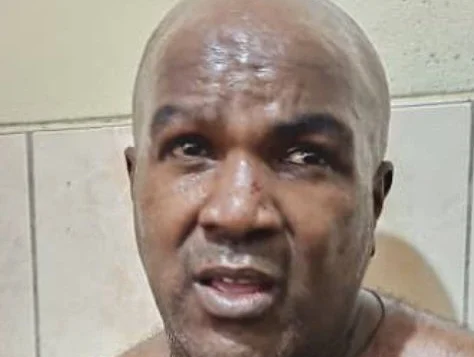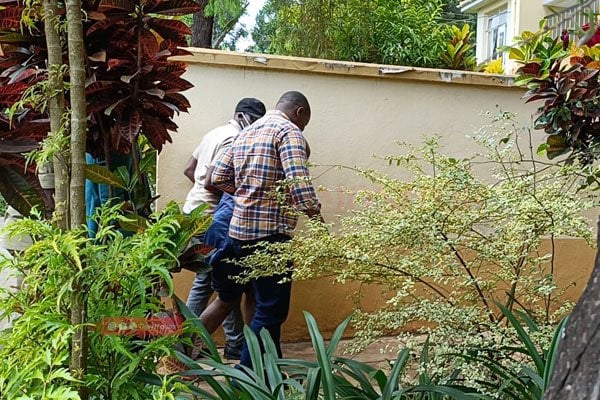Minister Mao Condemns Torture of Eddie Mutwe, Says Court Wrong to Try Victims of Abuse

Justice and Constitutional Affairs Minister Norbert Mao has issued a sharp condemnation of the alleged torture of Edward Ssebuufu, popularly known as Eddie Mutwe, and criticised the judiciary for continuing to try suspects who appear to have suffered abuse in custody.
Mutwe, a longtime aide and bodyguard to National Unity Platform (NUP) president Robert Kyagulanyi, was charged before the Chief Magistrate’s Court in Masaka on Monday, May 5, and subsequently remanded to prison.
He appeared in court limping and visibly in pain, prompting immediate public outrage and renewed scrutiny over his treatment in detention.
His court appearance followed a week of chilling online speculation, spurred by cryptic posts from Gen Muhoozi Kainerugaba—President Museveni’s son and army chief—who suggested on X (formerly Twitter) that Mutwe was being held in a basement and being forced to salute a portrait of the President while learning Runyankore.
The remarks were widely condemned as flippant and provocative, especially amid circulating images of a semi-naked, bearded man resembling Mutwe, appearing emaciated and disoriented.
In court, Mutwe was charged with both simple and aggravated robbery, allegedly committed in Manja village, Lwengo District. His co-accused, fellow bodyguard Achileo Kivumbi, faces similar charges.
The two were brought before Grade One Magistrate Abdallah Kayiza under tight security, with Mutwe barefoot and reportedly in a state of physical distress.
Mutwe's lawyer, Magallena Kazibwe, alleged that he had been tortured “five times a day”—beaten with electric wires, electrocuted, and had his genitals squeezed.
She also claimed police blocked her from entering the court compound for over 40 minutes, citing “orders from Kampala.”
Magistrate Kayiza did not record a plea and ordered Mutwe remanded to Masaka Prison pending further proceedings.
The magistrate did not directly address the torture allegations in his remand order, a silence that has drawn criticism.

In a strongly-worded statement issued the same day, Minister Mao called the situation a constitutional crisis.
“Bringing illegally detained, brutalised and tortured suspects before the courts of law is an abuse of judicial processes... and should be roundly condemned,” Mao said.
“The courts must act swiftly and handle these matters expeditiously based on precedent.”
He invoked the 2009 ruling in Uganda vs Robert Ssekabira and 10 others, in which Justice Ralph Ochan halted prosecution and ordered the release of suspects who had been tortured in detention.
That case established a key judicial standard that suspects’ constitutional rights must be fully respected before prosecution can proceed.
Mao stressed that the presumption of innocence was “unequivocal and non-negotiable” and warned against any appearance of judicial complicity in abuse.
“There are sufficient authorities to guide the courts as they exercise their discretion to deal with torture and other abuses of constitutional rights,” he said.
His intervention marks a rare instance of a senior government official openly criticising both security agencies and the judiciary in the same breath.
He also revealed that the Ministry of Justice has finalised a National Action Plan for Human Rights, which will soon be tabled before Cabinet.
The plan outlines institutional commitments to monitoring abuses, improving accountability in detention practices, and aligning Uganda’s laws with international human rights standards.
It includes the establishment of a Standing Committee on Human Rights and a toll-free hotline for citizens to report abuses, which will be managed in partnership with civil society organisations.
“We empower lives and restore hope,” Mao said, calling on all stakeholders to recommit to constitutionalism.
He added: “Law and arbitrary power are in eternal enmity,” quoting 18th-century statesman Edmund Burke.
The statement has drawn international attention, with Human Rights Watch urging Uganda’s courts to heed Mao’s call and halt proceedings tainted by torture.
In a post on X, Amnesty International said the case illustrates “a deepening culture of impunity” in Uganda’s law enforcement agencies and called for an independent investigation into Mutwe’s alleged treatment.
Opposition leaders have also responded. Robert Kyagulanyi accused the government of turning the courts into an “assembly line for oppression” and warned that such practices would only strengthen resistance.
“You can’t break the will of a free people with whips and wires,” he said during a press briefing in Kampala.
Mutwe’s case, now at the centre of Uganda’s human rights debate, has become emblematic of longstanding fears over enforced disappearances, torture, and the erosion of due process.
Activists say the unfolding events offer a litmus test for whether Uganda’s justice system can act independently, or whether it will continue to serve what they describe as a “security state.”
As the case returns to court in the coming days, all eyes remain on how the judiciary responds—not only to the criminal charges, but to the wider constitutional questions now looming large over the proceedings.
Justice Minister Norbert Mao has denounced the alleged torture of Eddie Mutwe and urged courts to reject cases tainted by abuse, as outrage grows over the treatment of opposition figures and Uganda faces mounting pressure to uphold constitutional rights.



0 Comments